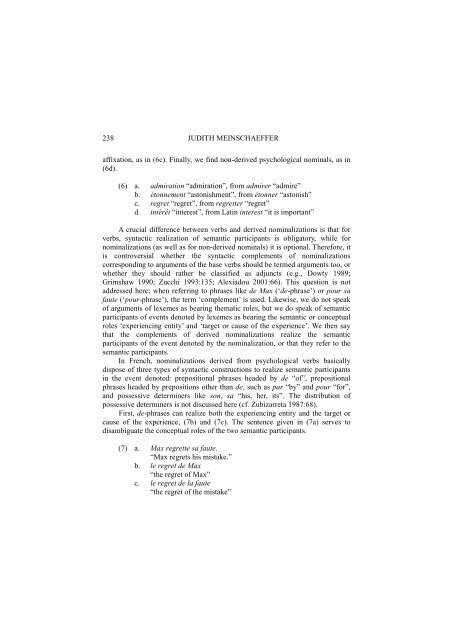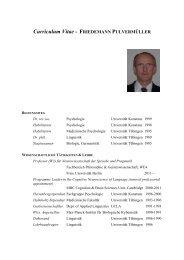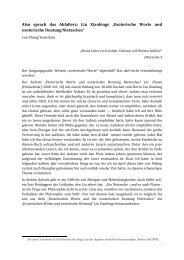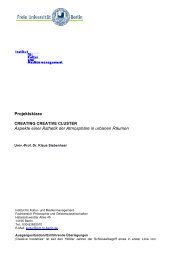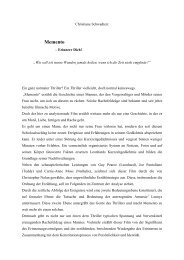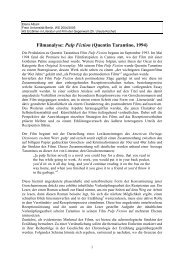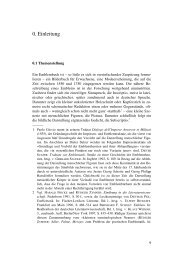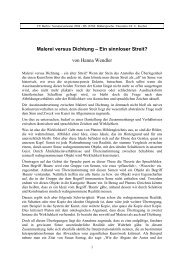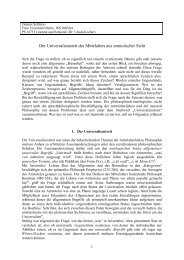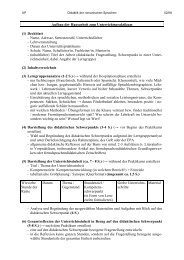nominalizations of french psychological verbs - Fachbereich ...
nominalizations of french psychological verbs - Fachbereich ...
nominalizations of french psychological verbs - Fachbereich ...
You also want an ePaper? Increase the reach of your titles
YUMPU automatically turns print PDFs into web optimized ePapers that Google loves.
238<br />
JUDITH MEINSCHAEFFER<br />
affixation, as in (6c). Finally, we find non-derived <strong>psychological</strong> nominals, as in<br />
(6d).<br />
(6) a. admiration “admiration”, from admirer “admire”<br />
b. étonnement “astonishment”, from étonner “astonish”<br />
c. regret “regret”, from regretter “regret”<br />
d. intérêt “interest”, from Latin interest “it is important”<br />
A crucial difference between <strong>verbs</strong> and derived <strong>nominalizations</strong> is that for<br />
<strong>verbs</strong>, syntactic realization <strong>of</strong> semantic participants is obligatory, while for<br />
<strong>nominalizations</strong> (as well as for non-derived nominals) it is optional. Therefore, it<br />
is controversial whether the syntactic complements <strong>of</strong> <strong>nominalizations</strong><br />
corresponding to arguments <strong>of</strong> the base <strong>verbs</strong> should be termed arguments too, or<br />
whether they should rather be classified as adjuncts (e.g., Dowty 1989;<br />
Grimshaw 1990; Zucchi 1993:135; Alexiadou 2001:66). This question is not<br />
addressed here; when referring to phrases like de Max (‘de-phrase’) or pour sa<br />
faute (‘pour-phrase’), the term ‘complement’ is used. Likewise, we do not speak<br />
<strong>of</strong> arguments <strong>of</strong> lexemes as bearing thematic roles, but we do speak <strong>of</strong> semantic<br />
participants <strong>of</strong> events denoted by lexemes as bearing the semantic or conceptual<br />
roles ‘experiencing entity’ and ‘target or cause <strong>of</strong> the experience’. We then say<br />
that the complements <strong>of</strong> derived <strong>nominalizations</strong> realize the semantic<br />
participants <strong>of</strong> the event denoted by the nominalization, or that they refer to the<br />
semantic participants.<br />
In French, <strong>nominalizations</strong> derived from <strong>psychological</strong> <strong>verbs</strong> basically<br />
dispose <strong>of</strong> three types <strong>of</strong> syntactic constructions to realize semantic participants<br />
in the event denoted: prepositional phrases headed by de “<strong>of</strong>”, prepositional<br />
phrases headed by prepositions other than de, such as par “by” and pour “for”,<br />
and possessive determiners like son, sa “his, her, its”. The distribution <strong>of</strong><br />
possessive determiners is not discussed here (cf. Zubizarreta 1987:68).<br />
First, de-phrases can realize both the experiencing entity and the target or<br />
cause <strong>of</strong> the experience, (7b) and (7c). The sentence given in (7a) serves to<br />
disambiguate the conceptual roles <strong>of</strong> the two semantic participants.<br />
(7) a. Max regrette sa faute.<br />
“Max regrets his mistake.”<br />
b. le regret de Max<br />
“the regret <strong>of</strong> Max”<br />
c. le regret de la faute<br />
“the regret <strong>of</strong> the mistake”


